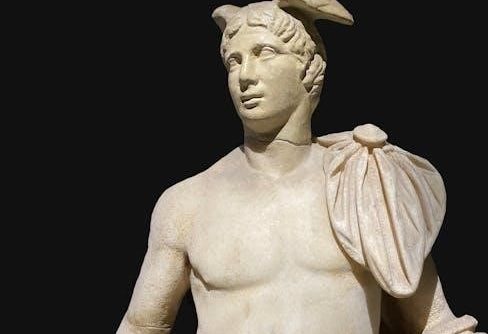
Greek mythology captivates with its timeless tales of heroes, gods, and monsters․ From Heracles’ labors to Theseus’ triumph over the Minotaur, these stories reveal human nature and divine power․ Explore the fascinating world through books and PDFs, uncovering the legacy of Zeus, sea monsters, and epic battles like the Trojan War․ This rich tapestry continues to inspire and educate, offering moral lessons and cultural insights․
1․1 The Origins and Significance of Greek Myths
Greek myths emerged from ancient oral traditions, offering explanations for natural phenomena and the universe’s workings․ These stories were vital for understanding the world and human nature․ Early myths, like those of Gaia and Uranus, laid the groundwork for later tales of gods and heroes․ Written sources, such as Hesiod’s Theogony and Herodotus’ Histories, preserved these narratives․ Myths served to establish cultural identity, provide moral lessons, and explain the divine․ Their significance endured, influencing art, literature, and even modern psychology, making Greek mythology a cornerstone of Western cultural heritage․
1;2 The Role of Heroes, Gods, and Monsters in Greek Culture
In Greek culture, heroes, gods, and monsters played pivotal roles, shaping societal values and beliefs․ Heroes like Heracles and Theseus embodied human virtues and flaws, inspiring admiration and moral reflection․ Gods, such as Zeus and Hera, represented natural forces and ethical principles, while monsters like the Minotaur and Hydra symbolized chaos and danger․ These figures were central to religious rituals, art, and storytelling, reinforcing cultural identity․ Their tales, preserved in books and PDFs, continue to influence literature and art, offering insights into human nature and the divine․ This rich legacy highlights the enduring impact of Greek mythology on Western civilization․
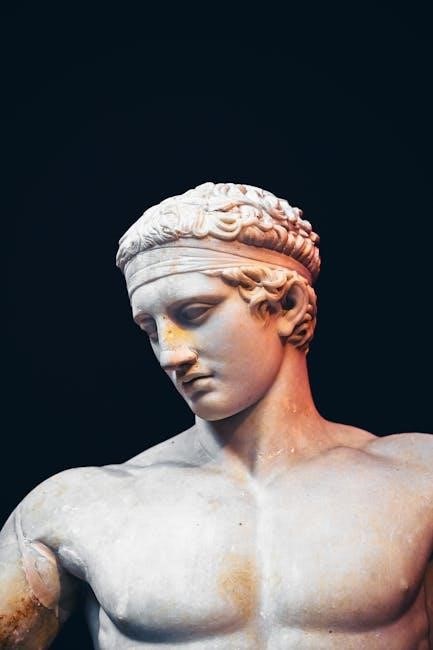
The Olympian Gods and Their Realm
The Olympian gods, led by Zeus, ruled from Mount Olympus, shaping the cosmos and human destiny․ Their stories, alongside primordial deities like Gaia and the Titans, form the backbone of Greek mythology․
2․1 Major Gods and Goddesses: Zeus, Hera, Poseidon, and Others
Zeus, the mighty king of the gods, ruled the skies, while his wife Hera, the queen, governed marriage and family․ Poseidon, the powerful god of the sea, controlled the oceans and tides․ Athena, the goddess of wisdom, and Apollo, the god of the sun, were revered for their intellect and creativity․ Artemis, the huntress, and Ares, the god of war, represented contrasting forces of nature and conflict․ Dionysus, the god of wine, and Hephaestus, the blacksmith of the gods, also held significant roles․ Together, these deities shaped the mortal world and inspired countless myths, reflecting human virtues and flaws through divine stories․
2․2 The Stories of Primordial Deities: Gaia, Uranus, and the Titans
Greek mythology begins with the primordial deities, starting with Gaia, the earth, and Uranus, the sky, who emerged from chaos․ Their union produced the Titans, powerful beings who ruled during the Golden Age․ These deities were central to the cosmos, shaping the world and its order; Gaia’s role as the nurturing earth contrasted with Uranus’ tyranny, leading to their downfall․ The Titans’ reign ended with their defeat by the Olympian gods, marking a turning point in Greek myths․ These stories explore the origins of the universe and the struggle for power, laying the foundation for later myths and legends․
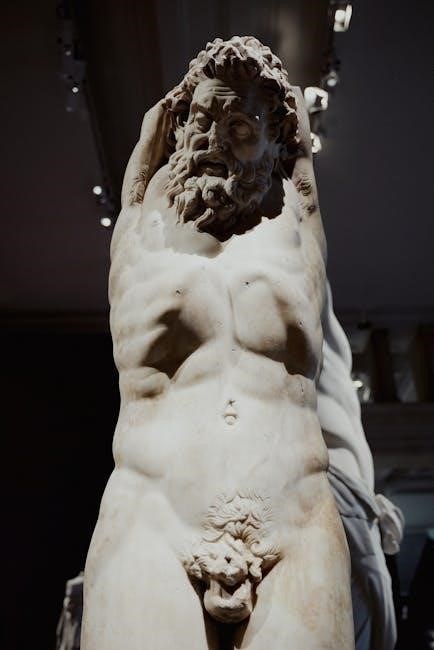
Heroes of Greek Mythology
Greek mythology is filled with legendary heroes like Heracles and Theseus, whose bravery and cunning inspired countless tales․ Their quests, such as slaying the Minotaur, showcase human resilience and divine influence, leaving a lasting legacy in culture and storytelling․
3․1 Heracles (Hercules): The Twelve Labors and His Legacy
Heracles, known as Hercules in Roman mythology, is one of the most famous heroes in Greek myths․ His twelve labors, set by King Eurystheus, showcased his extraordinary strength and determination․ From slaying the Nemean Lion to capturing Cerberus, the gates of the Underworld, each labor symbolized victory over chaos․ After completing these tasks, Heracles was purified of his guilt and welcomed back by the gods․ His legacy endures as a symbol of heroism and resilience, inspiring countless stories, art, and literature․ His tale remains central to Greek mythology, offering moral lessons and captivating audiences for centuries․ His story continues to be celebrated in books and PDFs today․
3․2 Theseus: The Hero Who Slayed the Minotaur in the Labyrinth
Theseus, a brave Athenian hero, is renowned for slaying the Minotaur in the Labyrinth․ Designed by Daedalus, the Labyrinth was a complex maze housing the monstrous Minotaur, fed on human sacrifices․ Theseus volunteered to end this terror, navigating the maze with Ariadne’s aid, who provided a thread to guide him out․ His victory symbolized triumph over fear and chaos, showcasing his courage and cunning․ The tale of Theseus and the Minotaur remains a central myth, highlighting heroism and ingenuity․ His legacy is celebrated in books and PDFs, inspiring art and literature for centuries, and continues to captivate audiences with its timeless appeal․
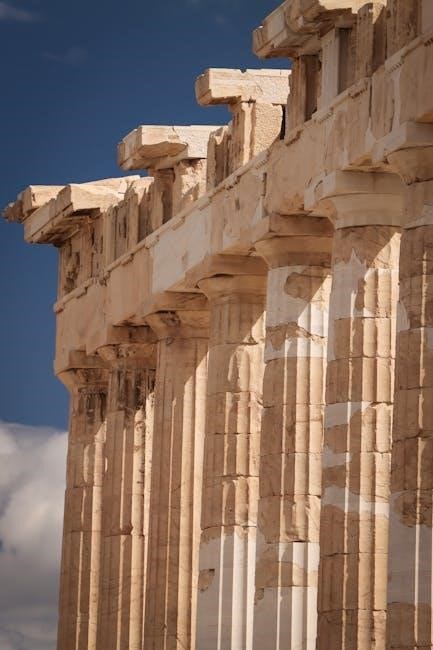
Monsters and Creatures in Greek Myths
Greek mythology is filled with terrifying monsters like the Minotaur, Chimera, and Hydra, as well as sea creatures such as Scylla and Charybdis․ These beings symbolize chaos and humanity’s deepest fears, shaping epic tales and cultural identity․
4․1 Legendary Beasts: The Minotaur, Chimera, and Hydra
Greek mythology is renowned for its fearsome creatures, each embodying unique horrors․ The Minotaur, a man-beast trapped in the Labyrinth, symbolized the consequences of hubris․ The Chimera, a fire-breathing hybrid of lion, goat, and serpent, represented the uncontrollable forces of nature․ The Hydra, a serpent-like monster with regenerative heads, was a relentless adversary in Heracles’ labors․ These creatures not only terrified mortals but also tested the courage of heroes, becoming central to legendary tales and the cultural imagination․
4․2 Sea Monsters and Underworld Creatures: Scylla, Charybdis, and More
Greek mythology is rich with terrifying sea monsters and underworld creatures that embody the unknown and the dangers of the deep․ Scylla and Charybdis, legendary sea monsters, symbolized the perils of maritime voyages, with Scylla as a sea monster preying on ships and Charybdis as a whirlpool devouring everything in its path․ Other creatures like Cyclops and Karkinos further illustrate the diversity of these beings․ These monsters not only tested heroes but also represented the uncontrollable forces of nature and the mysteries of the underworld, leaving a lasting impact on myths and cultural imagination․
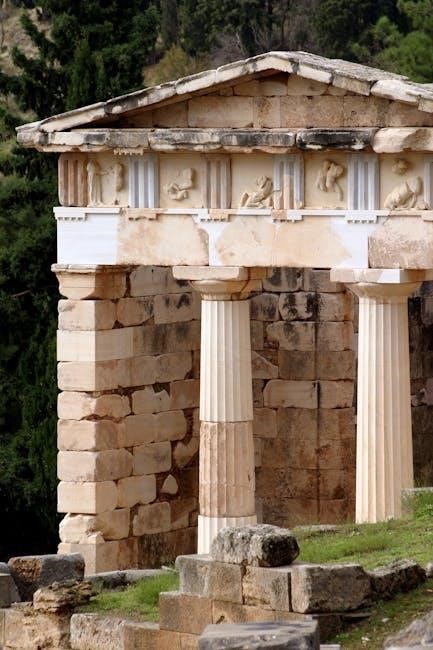
Key Myths and Their Impact
Greek myths like Heracles’ purification and Theseus’ slaying of the Minotaur captivate with their moral depth․ These stories, spanning from chaos to the Trojan War, shape cultural imagination, offering timeless lessons on heroism, sacrifice, and human nature, as seen in comprehensive mythological collections․
5․1 The Trojan War: A Clash of Heroes and Gods
The Trojan War, a legendary conflict, was sparked by the abduction of Helen by Paris, igniting a decade-long battle between Troy and Greece․ Heroes like Achilles and Odysseus fought alongside legendary warriors, while gods such as Zeus, Athena, and Apollo intervened, shaping the war’s outcome․ The epic clash culminated in the cunning strategy of the Trojan Horse, devised by Odysseus, leading to Troy’s fall․ This myth symbolizes valor, fate, and divine influence, embedding itself deeply in cultural narratives and inspiring countless adaptations․ The war’s legacy endures, reflecting human ambition and the enduring power of mythological storytelling․
5․2 The Labors of Heracles: Symbolism and Moral Lessons
The Twelve Labors of Heracles, imposed by King Eurystheus, symbolize perseverance, justice, and the triumph of virtue over adversity․ Each labor, from slaying the Nemean Lion to capturing Cerberus, represents a moral lesson, highlighting courage and selflessness․ Heracles’ struggles embody human frailty and divine potential, while his ultimate redemption underscores the power of atonement․ These myths serve as timeless allegories, teaching audiences about duty, sacrifice, and the human condition․ The labors of Heracles remain a cornerstone of Greek mythology, offering insights into ethical principles and the enduring appeal of heroic narratives․
Resources for Exploring Greek Myths
Discover comprehensive books and PDFs on Greek mythology, offering insights into heroes, gods, and monsters․ Explore online sources and translations for deeper understanding of ancient myths․
6․1 Recommended Books and PDFs on Greek Mythology
by Robin Hard and “Mythology: Timeless Tales of Gods and Heroes” by Edith Hamilton․ These resources provide in-depth analyses of myths, offering insights into their cultural and historical significance․ For digital learners, PDFs like “Heroes, Gods, and Monsters of the Greek Myths” by Bernard Evslin are accessible, making ancient stories engaging for modern readers․ These materials are essential for understanding the rich tapestry of Greek mythology․
6․2 Online Sources and Translations of Ancient Myths
Discover online sources and translations that bring ancient Greek myths to life․ Websites like Perseus Digital Library and The Theoi Greek Mythology offer extensive collections of myths, including texts by Hesiod and Ovid․ For PDFs, sources like “Heroes, Gods, and Monsters of the Greek Myths” provide comprehensive narratives․ Platforms such as Google Books and Project Gutenberg host classic translations, making ancient stories accessible․ These resources are invaluable for scholars and enthusiasts alike, offering both original translations and modern interpretations of Greek mythology’s timeless tales․